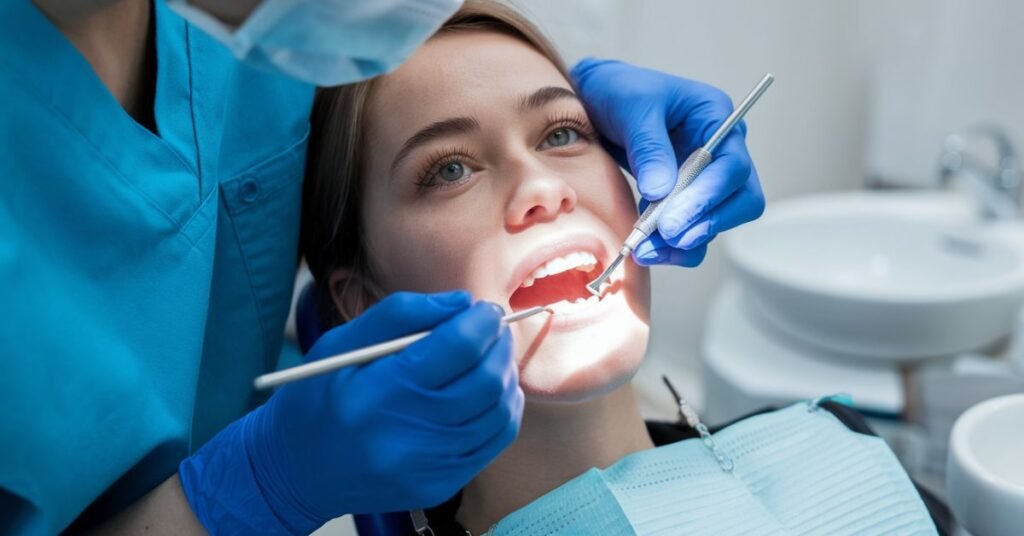Dental bonding helps fix small chips, gaps, or discoloration in teeth. Some insurance coverage may include it, but not all plans do. Many dental insurance providers cover essential dental health care, but specific treatments like bonding depend on the policy. Traditional plans often pay for necessary repairs, offering advantages in managing dental procedure costs and ensuring better oral well-being.
What is Dental Bonding?
Dental bonding is a cosmetic dental procedure that improves teeth using tooth-colored resin. A dentist applies the resin to fix chipped teeth, cracked teeth, gaps, and discolored teeth. A special light hardens the material, making it strong. This dental bonding process helps with teeth alignment correction, enhances dental aesthetics, and provides a lasting solution for improving tooth appearance.
Benefits of Dental Bonding for Teeth
Affordable Solutions:
Dental bonding is a cost-effective choice for cosmetic procedures, offering a budget-friendly alternative to veneers and crowns.
Minimally Invasive:
Dental bonding is a non-invasive dental procedure that requires minimal reduction of tooth enamel, preserving natural teeth.
Quick Results:
Dental bonding is a quick dental procedure that provides immediate results in one office visit, offering instant smile enhancement.
Does Insurance Cover Dental Bonding?
Dental insurance may provide cost coverage for dental bonding, depending on the insurance policy. Checking dental insurance policies helps manage dental procedure costs.
Dental Insurance Coverage
Dental insurance plans may cover dental bonding if it is medically necessary, not just a cosmetic procedure. Some coverage exceptions apply to aesthetic treatments. Understanding dental insurance policies helps manage dental treatment costs. Checking insurance for tooth bonding ensures proper financial planning for dental health and cosmetic dentistry insurance coverage.
Exceptions to the Rule
Accidental Damage:
Dental bonding helps repair accidental damage from sports-related incidents or injuries. Some insurance coverage includes cost coverage for dental bonding for trauma under emergency dental treatment insurance and accidental tooth damage coverage.
Medical Necessity:
Dental bonding is medically necessary for a tooth chip affecting oral health. Some insurance coverage includes dental bonding for functional needs under tooth repair insurance policy and medically necessary dental procedures.
Alternative Treatments:
Dental insurance may cover alternative therapy like dental crowns for stronger tooth protection. A dentist helps choose available solutions, while an insurance provider explains insurance-approved dental procedures, tooth repair coverage options, and dental procedure reimbursement for affordable dental solutions.
The Cost of Dental Bonding
Out-Of-Pocket Expenses
Dental bonding costs depend on dental practice location, bonding amount, and dentist expertise. Without health insurance, the total costs range from $300 to $600 per tooth. Understanding dental bonding cost factors, insurance exclusions for dental work, and affordable cosmetic dentistry helps manage out-of-pocket dental expenses for dental bonding affordability.
Payment Plans
Many dental practices offer flexible payment plans to help patients afford dental bonding. Discussing financing solutions with a dentist ensures budget-friendly dental treatments. Financing dental procedures and affordable dental care plans provide dental bonding cost assistance for those needing insurance alternatives for dental work.
How Much Does It Cost to Get Dental Bonding?

The cost of dental bonding depends on many variables. The location of dental practice, the extent of bonding procedure, and the expertise required affect the price. The average dental bonding costs range from $300 to $600 per tooth. Many dentists offer payment plans and financing solutions for affordable cosmetic dental care. To get an accurate cost estimate, consult a dentist and discuss budget-friendly options. Proper dental procedure budget planning helps make dental bonding affordability easier for patients
Is dental bonding worth it?
Dental bonding is a cosmetic enhancement that helps restore damaged teeth. It fixes chipped teeth, discolored teeth, and gapped teeth. It is a cost-effective, noninvasive option that gives quick results. Consider these factors before choosing dental bonding.
Cosmetic Enhancement
- Improves smile appearance by fixing chipped teeth, gapped teeth, and discolored teeth
- Provides a natural look that blends with other teeth
- Helps boost confidence with a brighter, even smile
Affordable
- A cost-effective choice compared to veneers or crowns
- Fits tight budgets while providing cosmetic improvement options
- Makes accessible cosmetic dentistry possible for more people
Minimally Invasive
- Requires minor enamel removal, keeping the natural tooth structure intact
- A less invasive option than crowns and veneers
- Provides safe cosmetic dental treatment with gentle application
Dental Bonding Produces Quick Results
- Completed in one office visit
- Gives instantaneous improvements with a noticeable change
- Avoids a protracted treatment process
Longevity
- Durable but may need touch-ups or replacements over time
- Lifespan depends on oral hygiene practices and restorative options
- Less durable than crowns, but a good investment in dental care
Insurance Coverage
- Insurance coverage depends on the dental insurer
- Cosmetic procedures often have exceptions
- Accidental damage or medical needs may qualify for coverage
How Long Does Dental Bonding Last?

Proper Oral Hygiene:
Good oral hygiene habits keep teeth strong and healthy. Brushing and flossing prevent staining and decay in bonded areas. Regular dental check-ups help maintain dental bonding treatments and improve their longevity. A proper bonded teeth cleaning routine protects your smile.
Dietary Habits:
Certain food and beverages affect bonded teeth. Avoid coffee, tea, and red wine to help with eliminating stains and keeping a bright appearance. Never use teeth as tools or chew on biting hard objects to prevent chipping. These dental bonding care tips help with damage prevention and long-lasting results.
Oral Habits:
Avoid nail biting, chewing ice cubes, and using teeth to open packages. These actions put stress on bonded teeth and reduce their lifespan. Breaking habits like these helps preserve bonding and extend longevity. Following tooth bonding care tips prevents damage and keeps cosmetic dental work strong and healthy.
Location and Extent of Bonding:
Durability of bonding depends on tooth placement. Front teeth experience less biting force, so bonding lasts longer. Molars handle chewing and pressure-heavy tasks, which may shorten bonding lifespan. Proper dental bonding maintenance tips help preserve tooth bonding longevity and strength.
Maintenance and Repairs:
Regular dental check-ups keep bonded teeth in good condition. Early detection of issues like wear and damage prevents major problems. Repairs and touch-ups by a dentist extend lifespan and durability. Proper dental bonding maintenance ensures long-lasting, healthy teeth.
Quality Bonding Materials:
A skilled dentist uses quality bonding materials for better durability. High-performance resins provide strong bond strength and endurance. Choosing the best materials for dental bonding ensures long-lasting dental bonding and protection. Dentist-recommended bonding materials help maintain bonding material lifespan and tooth strength.
FAQ.s
How long does dental bonding last?
Dental bonding can last 3 to 10 years with proper care, including good oral hygiene and avoiding biting hard objects.
Does dental bonding stain over time?
Yes, bonded teeth can stain from coffee, tea, red wine, and smoking. Regular brushing and avoiding staining foods help maintain color.
Is dental bonding painful?
No, dental bonding is a painless procedure because it requires minimal enamel removal and usually no anesthesia.
Can dental bonding fix gaps between teeth?
Yes, dental bonding can fill small gaps and improve tooth shape, creating a more even smile.
How do I take care of bonded teeth?
Brush twice daily, floss regularly, avoid biting hard objects, and visit the dentist for check-ups to keep bonding in good condition.
Conclusion
Dental bonding is a cost-effective solution for improving teeth appearance. It helps fix chipped, discolored, or gapped teeth without major dental procedures. The treatment is quick, minimally invasive, and can last many years with proper care. Avoiding staining foods, hard objects, and bad habits helps maintain bonded teeth. Regular brushing, flossing, and dental visits keep them in good condition.
Is Dental Bonding Covered by Insurance? It depends on the reason for treatment. If bonding is for cosmetic reasons, most insurance plans do not cover it. However, if bonding is needed for medical purposes, like repairing a damaged tooth, insurance may partially cover the cost. Checking with a dental insurer helps understand coverage details and possible out-of-pocket expenses.
- Harley Davidson Insurance Understanding Coverage Options
- Is Laser Therapy Covered by Insurance
- How Much Is Teeth Whitening At Dentist With Insurance
- What Happens If You Crash A Rental Car Without Insurance



